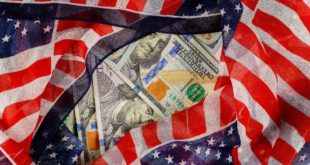If Staten Island is allowed to secede, our national technocrats fear that might open up countless similar demands for self-determination across the nation. For the elites, the current status quo works quite well and they want to keep it that way. Original Article: "Let Staten Island Secede!" [embedded content] Tags:...
Read More »American Prosperity Is Greater than Most of Us Realize
Traveling was once a luxury for the rich, but today even working-class people enjoy vacations. In America, people have gotten so wealthy that planning summer vacations is a priority for many families. Living standards have improved so tremendously that elite amenities are now commonplace. Nearly 90 percent of American homes rely on air-conditioning, and 92 percent of households have access to at least one vehicle. Relative to the globe, most Americans are high-income...
Read More »The Imperial Russian Regime was Neither “Great” nor “Enlightened”
Pope Francis made headlines last week when he described the Russian Empire as "enlightened" and invoked the names of two expansionist Russian czars as examples of Russia's "great culture." In impromptu remarks, Francis said to a group of Russian Catholics, “You are the heirs of the great Russia: the great Russia of saints, of kings, the great Russia of Peter the Great, of Catherine II, of that great, enlightened Russian empire, of great culture and great humanity.”...
Read More »Golf Merger Is Opposed by Congress. This Is Misguided
Members of Congress claim to be "concerned" over the proposed merger between LIV Golf and the PGA Tour. They should be supporting it or, even better, backing off completely. Original Article: "Golf Merger Is Opposed by Congress. This Is Misguided" [embedded content] Tags: Featured,newsletter
Read More »Power Vacuum: How the State Wants to Suck Electricity from the SUV You Are Required to Buy
A literal power vacuum—that’s what California Senate Bill 233 proposes. And what is to be sucked? Your electric car. The bill—which has passed the Senate and is now winding its way through the Assembly—states that all new electric vehicles to be sold in California after 2030 be “bidirectional.” Because the state has decided to essentially go all electric without having the ability to actually provide enough electricity, the climate warriors have gotten a bit creative...
Read More »Local Secession Movements: From Staten Island to the South
On this episode of Radio Rothbard, Ryan McMaken and Tho Bishop look at county and city-level secession movements and what it means for political self-determination. In a recent article, Ryan McMaken highlighted renewed calls for Staten Island to secede from New York City, but other recent examples include attempts by taxpayers in areas of Georgia and Alabama to break away from the control of mismanagement of local governments. Tho and Ryan look at the value these...
Read More »Eurodollars as a Fractional Reserve Market
We should not just be concerned about problems in the American banking system, but also about the proliferation of Eurodollars. Original Article: "Eurodollars as a Fractional Reserve Market" [embedded content] Tags: Featured,newsletter
Read More »Consumer Credit Is Expanding Even While the Fed Pushes up Interest Rates
To me, a wise and humane policy is occasionally to let inflation rise even when inflation is running above target. —Janet Yellen We have sighted the enemy and he is us. —Pogo On July 26, 2023, the Federal Reserve raised interest rates by a quarter of a percentage point. By the time you read this, your credit card interest rate will probably have increased for your September statement. When headlines talk about the Fed raising interest rates, the annual percentage...
Read More »Slobodian Contra Rothbard
Crack-Up Capitalism will be of interest to many readers of The Austrian because of what it says about Murray Rothbard; and for the most part, I shall limit my review to discussing this. The main point of the book is easy to grasp. In recent decades, the notion of a centralized state has come under fire in various ways, including attempts to secede, to create “enterprise zones” within states, and to establish societies without a state at all. Quinn Slobodian, a...
Read More »Thatcher’s New Style of Government
The possible bankruptcy of Thames Water Company in Great Britain brings to mind the heady days 40 years ago when Margaret Thatcher's government was privatizing state-owned enterprises, including TW. Not all privatization stories have happy endings. Original Article: "Thatcher's New Style of Government" [embedded content]...
Read More » Swiss Economicblogs.org
Swiss Economicblogs.org




